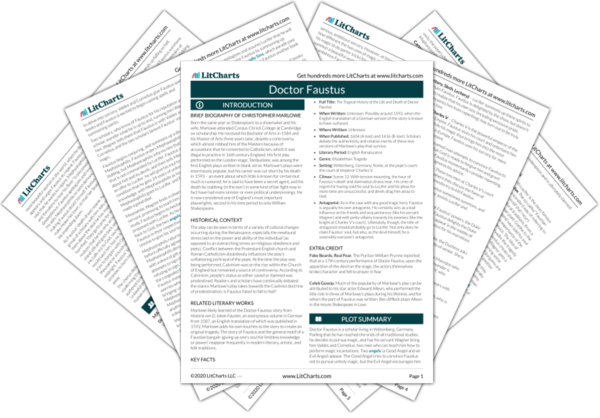Welcome to the LitCharts study guide on Christopher Marlowe's Doctor Faustus. Created by the original team behind SparkNotes, LitCharts are the world's best literature guides.
Doctor Faustus: Introduction
A concise biography of Christopher Marlowe plus historical and literary context for Doctor Faustus.
Doctor Faustus: Plot Summary
A quick-reference summary: Doctor Faustus on a single page.
Doctor Faustus: Detailed Summary & Analysis
In-depth summary and analysis of every scene of Doctor Faustus. Visual theme-tracking, too.
Doctor Faustus: Themes
Explanations, analysis, and visualizations of Doctor Faustus's themes.
Doctor Faustus: Quotes
Doctor Faustus's important quotes, sortable by theme, character, or scene.
Doctor Faustus: Characters
Description, analysis, and timelines for Doctor Faustus's characters.
Doctor Faustus: Symbols
Explanations of Doctor Faustus's symbols, and tracking of where they appear.
Doctor Faustus: Literary Devices
Doctor Faustus's key literary devices explained and sortable by chapter.
Doctor Faustus: Quizzes
Detailed quizzes covering every scene of Doctor Faustus
Doctor Faustus: Theme Wheel
An interactive data visualization of Doctor Faustus's plot and themes.
Brief Biography of Christopher Marlowe
Born the same year as Shakespeare to a shoemaker and his wife, Marlowe attended Corpus Christi College at Cambridge on scholarship. He received his Bachelor of Arts in 1584 and his Master of Arts three years later, despite a controversy which almost robbed him of the Masters because of accusations that he converted to Catholicism, which it was illegal to practice in 16th century England. His first play performed on the London stage, Tamburlaine, was among the first English plays written in blank verse. Marlowe's plays were enormously popular, but his career was cut short by his death in 1593 – an event about which little is known for certain but much is rumored; he is said to have been a secret agent, and his death by stabbing (in the eye!) in some kind of bar fight may in fact have had more sinister or even political underpinnings. He is now considered one of England's most important playwrights, second in his time period to only William Shakespeare.
Get the entire Doctor Faustus LitChart as a printable PDF.

Historical Context of Doctor Faustus
The play can be seen in terms of a variety of cultural changes occurring during the Renaissance, especially the newfound stress laid on the power and ability of the individual (as opposed to an overarching stress on religious obedience and piety). Conflict between the Protestant English church and Roman Catholicism doubtlessly influences the play's unflattering portrayal of the pope. At the time the play was being performed, Calvinism was on the rise within the Church of England but remained a source of controversy. According to Calvinism, people's status as either saved or damned was predestined. Readers and scholars have continually debated the stance Marlowe's play takes towards the Cavlinist doctrine of predestination: is Faustus fated to fall to hell?
Other Books Related to Doctor Faustus
Marlowe likely learned of the Doctor Faustus story from Historia von D. Iohan Fausten, an anonymous volume in German from 1587, an English translation of which was published in 1592. Marlowe adds his own touches to the story to create an original tragedy. The story of Faustus and the general motif of a Faustian bargain (giving up one's soul for limitless knowledge or power) reappear frequently in modern literary, artistic, and folk traditions.
Key Facts about Doctor Faustus
- Full Title: The Tragical History of the Life and Death of Doctor Faustus
- When Written: Unknown. Possibly around 1592, when the English translation of a German version of the story is known to have surfaced.
- Where Written: Unknown.
- When Published: 1604 (A-text) and 1616 (B-text). Scholars debate the authenticity and relative merits of these two versions of Marlowe's play that survive.
- Literary Period: English Renaissance
- Genre: Elizabethan Tragedy
- Setting: Wittenberg, Germany; Rome, at the pope's court; the court of emperor Charles V.
- Climax: Scene 13. With tension mounting, the hour of Faustus's death and damnation draws near. His cries of regret for having sold his soul to Lucifer and his pleas for more time are unsuccessful, and devils drag him away to Hell.
- Antagonist: As is the case with any good tragic hero, Faustus is arguably his own antagonist. He certainly acts as a bad influence on his friends and acquaintances (like his servant Wagner) and with petty villainy towards his enemies (like the knight at Charles V's court). Ultimately, though, the title of antagonist should probably go to Lucifer. Not only does he claim Faustus' soul, but also, as the devil himself, he is ostensibly everyone's antagonist.
Extra Credit for Doctor Faustus
Fake Beards, Real Fear. The Puritan William Prynne reported that at a 17th century performance of Doctor Faustus, upon the apparition of the devil on the stage, the actors themselves broke character and fell to prayer in fear.
Celeb Gossip. Much of the popularity of Marlowe's play can be attributed to his star actor Edward Alleyn, who performed the title role in three of Marlowe's plays during his lifetime, and for whom the part of Faustus was written. Ben Affleck plays Alleyn in the movie Shakespeare in Love.












